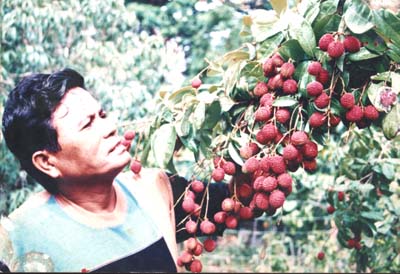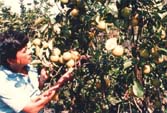| His
breakthrough in the field of agriculture about
grapes,
durian, rambutan,
mangosteen,
lanzones, lychees,
longans, imported and local
mangoes, Davao
pummelo, and other exotic fruit trees were published
in national newspapers, and magazines. His
technologies were even used as references in radio
stations and TV programs. |
 |
In his history of National Fruits Research and Development
Team pf Philippine Council for Agricultural Research and
Development (PCCARD), Department of Science and Technology,
he is the only fruit specialist who is a non-UP, non Ph.D.
member. He was also a resource speaker-lecturer on the
production of high value fruits of Technology and Livelihood
Resources Center (TLRC) under the Office of the President of
the Philippines.
|
During the Marcos regime, he planted grapes and
other fruit trees at the Malacañang grounds to
support the First Lady Imelda Marcos' Green
Revolution Project. Former First Lady Ming Ramos
ordered the transfer of big trees of rambutan,
lychee, longan and others from the author's former
UP BLISS Economic Garden for her Clean and Green
Project. All of these trees are now growing well at
the Malacañang ground. |
 |
He
also provided technical know-how in propagating a million
grafted seedlings of carabao
mango, durian, lychee,
longan
and longkong for a big company in Negros.
Every Sunday, he gives free lectures and pointers at
his fruits showcase at DENR-PAWB-Dizon Botanic Fruit Garden
and Techno-Demo Center at the Ninoy Aquino Parks and
Wildlife, North Avenue, Diliman, Quezon City. And to ensure
the continuity of his vision to improve the condition of our
country's fruit tree industry, he passed on the knowledge to
his eldest son Gary S. Dizon, a BS Agriculture graduate of
Gregorio Araneta University Foundation.
And to further pursue this endeavor, he wrote and
published Practical Guide to Backyard or Orchard Farming,
this book as a guide in backyard and orchard farming.
With these breakthroughs, the author should be rich now
but his own countrymen exploited him. In his desire to
promote planting of high value fruit trees in different
provinces of the country, he was deceived by several
businessmen and other influential individuals to tie up with
them.
Although there are many lucrative offers from big
plantations in the country and abroad as consultant, the
author chooses to remain independent in his struggle for the
betterment of the fruit industry and live in a low cost
housing BLISS project of the government besides his first
fruit paradise.
The author is rich in breakthroughs and superior
varieties of fruit trees that can be reproduced in millions
or billions of seedlings for the government's food
production program.
A Ph.D. Thai who graduated from CLSU commented that if
only the author is in Thailand, he should be very rich now.
With his breakthroughs, he would be congratulated by the
King of Thailand and would be fully supported financially
and morally.
The present status of the country's fruit industry
exemplifies the case of the author. Perhaps this is the only
country in the world where plant technology is being fought
in court. And the irony of it, state universities whose
objective is to research modern technology appears the one
hindering the progress. |

